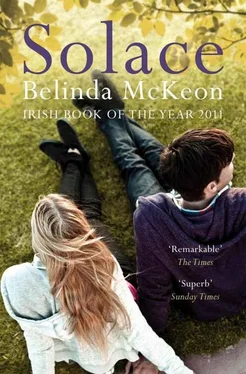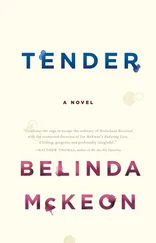Even standing right up against the pen, Mark could not see the gap through which the calf had escaped. It could only have slipped through the lower gate rungs, or slid out between the gate and the wall, but that was impossible; both spaces were too tight. He unlatched the gate quickly and hurried the calf back into the pen, still holding the tail, tapping the toe of his boot gently to the back shins. When he latched the gate again every animal in the place seemed to call out at once, and from somewhere he heard a dog. The calf, ignoring the attempts of its mother to nose it sharply backwards, stuck its head through the bars of the gate and watched him as he moved away. The eyes shone. Mark could not help himself: he raised a hand slowly in some sort of farewell. He felt intensely foolish and intensely calm.
At the back door, a woman with a pregnant belly was shushing the dog. Mark kept to the shadows of the house and walked back along the crisp white lane to the car.
He had been driving only for a couple of seconds when he met headlights coming around the bend. They dimmed. From the number-plate, and from the startled face in the glare of his own lights just before he dimmed them, he saw that the other driver was Frankie. As they passed each other slowly, both squeezed tight to the ditch on the narrow lane, he watched Frankie’s face turn from surprise, through confusion, to suspicion. Mark raised his hand from the wheel and gave him the wave of one driver to another; a quick, light-handed salute. They were past each other before Frankie’s hand could come any distance from his wheel. In the next instant, in his rear-view mirror, Mark watched the tail-lights of the van brighten and dim as Frankie stalled, as he tried to decide whether there was something he needed to do.
‘Go home,’ Mark said quietly, into the mirror, and after a moment, the tail-lights flickered again and the van moved away. Mark waited until the glow of it had gone from his mirror and been replaced by the dark. He drove on.
*
‘What will I do with you?’ he said to her, and he looked at the clock; when he switched the television on she took the remote out of his hand and pushed the buttons so that only static appeared on the screen. She pointed to it and shouted, but she would not give him back the remote. He got up and turned the set off at the switch. She pressed the buttons of the remote again for a while, but nothing could happen.
He looked around the room for something to entertain her. He could see nothing. Photographs he did not want to look at and newspapers he had not read. Ornaments that she could break and cut herself on. The dog. ‘Look at the doggie,’ he said, and she turned.
‘What’s the doggie’s name?’ he said, and she gave the dog a name of her own.
‘No, the dog’s name is Scruff,’ he said, and she ignored him.
Then the dog wanted to go out, so he opened the door for her. When he closed it again and turned back to the couch the child was regarding him with disapproval. ‘Had to do her business,’ he said, but the child just stared. ‘Has your daddy no toys for you?’ he said, and at the mention of her father she looked towards the door.
A bag of Mark’s was leaning against the couch; it was like his old schoolbag, a muddy coloured canvas square buckled up with two straps. Maybe it was his old schoolbag, Tom thought, trying to remember. But there had been biro scrawls all over that; he could remember asking Mark what the hell he had needed with them, why he would write on his bag and let others do the same. There was nothing on this bag, no names or drawings or ink stains or cigarette holes.
‘Open!’ the child said, and he did as he was told.
‘Just books,’ he said to the child, an apology, but she tried to reach past him to pull out the books.
‘Not yours,’ he said to her, taking one of them from the bag; it was thick and heavy, hundreds of pages in it, the covers bound in thick plastic.
The child shouted her word.
‘These are your daddy’s books, not yours,’ Tom said, taking out another one, and another; there was nothing in the bag that he could read, or even show, to the child.
Whatever the child was saying, she said it again, and this time there was the beginning of a whine in her voice, so he took a book and let the pages open where they fell. The words seemed to run into each other and the names were all strange, and whoever was telling the story was going about it a very long way. Along the sides of the page, Mark had written things in pencil. They made no sense to Tom. He chose a passage of the story, and he read it aloud. It was something about a wake, something about a pile of coats, something about not being able to hear. The child seemed to like it, or she liked the sound of the words; she watched his face as he read the sentences, as he did the different voices and spoke out the parts in between.
‘This is awful rubbish this fellow is telling us,’ he said to her, after a few minutes, but she put her hands to the book.
‘Look, someone here is saying hello to you,’ he said, seeing the word in pencil on the edge of the page. It seemed a strange word to be there, but no stranger than any of the others. ‘Hello,’ he said to the child, in a sing-song voice, and she frowned at him and shook her head.
‘Open,’ she said, and she grabbed at the book.
‘Hold on, hold on,’ he said, laughing, and she looked at him for a moment and moved her fingers to his hand. Her skin was soft and damp. She tugged at him.
‘Open,’ she said.
‘Keep going?’ he said, and she nodded and shouted a word he did not know.
‘Right you are,’ he said, and read on until the headlights of the car came up the avenue and spilled across the wall.
The phone conversation between Mark and Frankie the next morning was stilted at first. Frankie, Mark knew, was suspicious of him, and expecting that Mark would be equally suspicious in return. No mention was made of the way they had met on the lane to Tommy’s old place the night before. No mention was needed.
Mark spoke calmly and explained what he was calling to ask, and when Frankie began to understand that he was not looking for an argument, not coming with an accusation, he began to talk, and he told Mark almost everything he needed to know. Things became clearer. This did not make them easier to take. It had not been easy to hear about the state some of the animals had been in when his father had put them up for sale. He had never known his father not to spot a lame cow, not to have her treated; whenever there had been fluke in the herd, the herd had been dosed. But this time had been different. The animals Frankie had paid for had not been the animals Mark had imagined. The price Frankie had given for them had not, after all, been so low or so unreasonable.
‘They weren’t a herd of fat tics, Mark,’ he said, and Mark could hear that he would have preferred not to be going back over this ground. ‘There was a couple of them only in middlin’ shape.’
‘They were never like that before,’ Mark said, and immediately at the other end of the line Frankie murmured in assent.
‘I know that, sure,’ Frankie said. ‘Everyone knows that.’
The tractors were something else Mark was glad of the chance to talk about. Frankie had seen them, and he agreed that they needed to be put up for sale. Their value, he said, would dwindle by thousands for every week that Tom held on to them.
‘They’ll be an absolute cunt to get rid of, the way things are gone,’ he said, gloomily, ‘but if you put a price on them that’s any way reasonable, there’ll be some fucker from Meath or Kildare that’ll take them off your hands.’
Frankie told him other things as well. That for Tom to start again, to start small with a couple of animals, was the right idea; that there was a mart coming up in Edgeworthstown where he could buy a couple of heifers and bullocks to be going on with. He gave Mark an idea of much Tom should be willing to spend. He talked to him of the deadlines Tom needed to meet with his grant applications for the coming year. There was farm help Tom could get, too, Frankie said; someone who would come around a couple of times a week and help him to keep the place going.
Читать дальше












